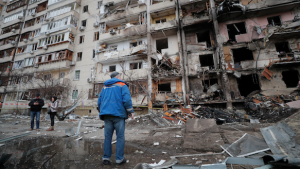
Foreign businesses set for ‘nationalization’

Hundreds of foreign companies have announced a partial or total withdrawal from Russia in recent weeks amid continuing fighting in Ukraine. These include: Apple, IKEA, McDonald’s, Microsoft, IBM, Sony, Shell, Porsche, Volkswagen, H&M, Inditex (that includes Zara, Bershka, Massimo Dutti, Pull&Bear), Procter & Gamble (that covers brands including Tide, Ferry, Pampers, and Head & Shoulders), Universal, Mars, Warner and Sony Music.
In response to the announcements, Putin on Thursday backed a government proposal that will impose “external management” on foreign companies that decide to leave Russia.
The legislation in question was described by the ruling United Russia party as the “first step towards nationalizing foreign-owned organizations leaving the Russian market”. Under the rules, there are two cases in which temporary administration can be imposed on a company more than 25 percent is owned by foreign individuals:
- The head or management of the company “effectively ceases” management — for example by leaving the organization without oversight;
- Company management takes decisions that could lead to an unjustified cessation of activities, liquidation or bankruptcy. These include public announcements about the cessation of the company’s activities “in the absence of clear economic reasons”.
In the first case, external administrators are appointed for three months; in the second for six. In the second case the process can be reversed: shareholders who own more than 50 percent of the company can apply to the courts to remove the external administration and resume work in Russia, or sell their stake to “suitable new owners”.
The decision about whether to appoint external administrators will be taken by Moscow’s Arbitration Court. In each case, the owners will be given five working days to inform the court of their intention to resume activities, transfer their share to fiduciary management or sell it.
External administration means state managers will be given full powers to run the company. For non-financial organizations, these will be representatives from state development bank VEB.RF; for financial companies the managers will come from the Deposit Insurance Agency. Either way, they will be given access to all information about the company and its former management, including commercial secrets.
The external administration will be obliged to resume, or continue, the company’s activities, prevent bankruptcy, and protect jobs and property, including paying wage arrears. But its main task will be to create a new organization via a bankruptcy procedure. Immediately after appointment, administrators will be obliged to start drawing up a register of creditor claims (creditors will be able to declare their claims within a month), and an inventory of property.
The end product will be a new company. Up to 6 months later, shares in the new company will be put up for auction and the old organization officially liquidated. Buyers with similar types of business will have priority when bidding and, if the shares cannot be sold at their reserve price, they will be bought by the Russian government
New owners will face some mandatory requirements: retaining at least two-thirds of the company’s workforce, and continuing the company’s activities in Russia for at least a year. The external administration will ensure these obligations are met — if they are not, the contract can be terminated and a new auction held.
A statement from The Bell: The risks for journalists working in Russia are extremely high as a result of a new law that punishes the spread of ‘fake news’ with up to 15 years in jail. As Russian officials refuse to describe events in Ukraine as a ‘war’, preferring the term ‘special military operation’, we believe we can no longer safely cover events in Ukraine. As a result, we’re halting all direct coverage of Russia’s ‘special military operation’ until further notice — although we will continue to report on its far-reaching economic, political and social consequences. If you notice that we’re being circumspect about our language — you’re right. We are. We believe it’s the only way to protect our journalists.




